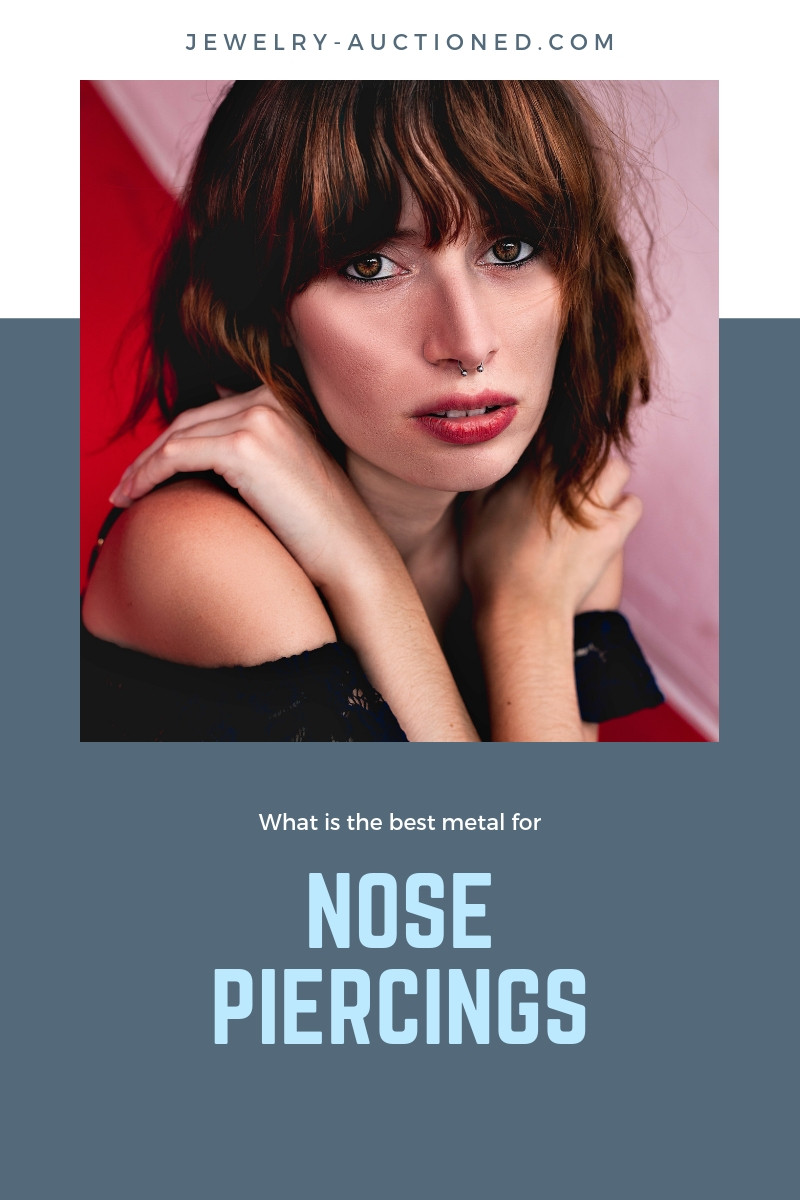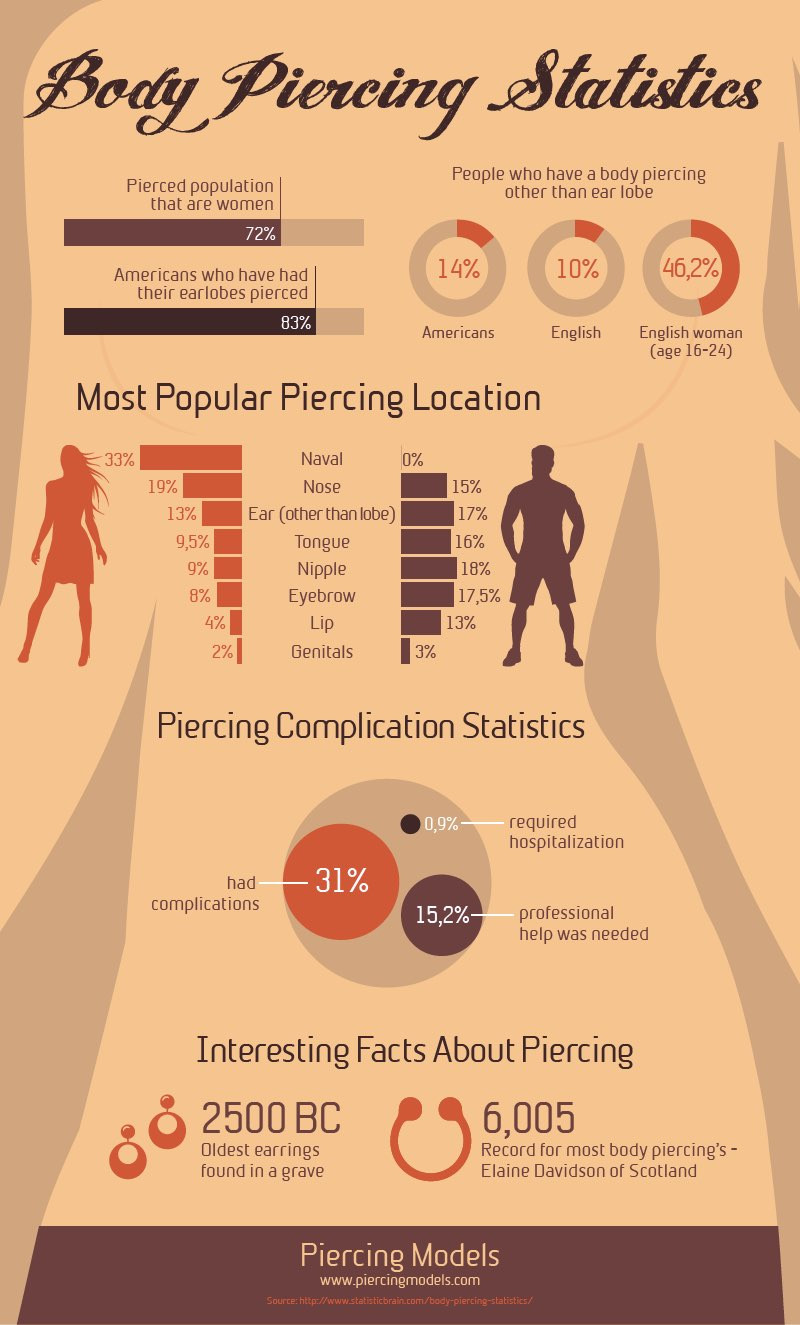
發佈於2nd Apr 2019
修改於17th May 2023
Dɛn Ne Dade a Eye Sen Biara a Wɔde To Hwene mu?
 Woresusuw ho sɛ wobɛtow wo hwene mu? Ebia wowɔ piercing dedaw nanso w’ani gye ho sɛ wubesua pii afa hwene ring dade ho? Here’s the thing, piercings yɛ mpɛn pii no ahobammɔ ne stylish, nanso dade run gamut fi high-quality ne ahobammɔ, to flat out yaw akwahosan asianes. Ɛho hia sɛ wusua dade a eye sen biara ne nea enye koraa ma hwene nkaa, sɛnea ɛbɛyɛ a wubetumi asi gyinae a ɛfata na ahobammɔ wom.
Woresusuw ho sɛ wobɛtow wo hwene mu? Ebia wowɔ piercing dedaw nanso w’ani gye ho sɛ wubesua pii afa hwene ring dade ho? Here’s the thing, piercings yɛ mpɛn pii no ahobammɔ ne stylish, nanso dade run gamut fi high-quality ne ahobammɔ, to flat out yaw akwahosan asianes. Ɛho hia sɛ wusua dade a eye sen biara ne nea enye koraa ma hwene nkaa, sɛnea ɛbɛyɛ a wubetumi asi gyinae a ɛfata na ahobammɔ wom.
So hwene nkaa yɛ abufuw nyinaa? Yep. Nokwarem no, U.S. mmea bɛyɛ ɔha biara mu 19 ne U.S. mmarima ɔha biara mu 15 na wɔatutu wɔn hwene mu.

Sɛnea ɛte wɔ agude biara ho no, akwahosan ho nneɛma bi wɔ hɔ a ɛsɛ sɛ wususuw ho. Ɛne sɛ, nneɛma abien a ɛho hia wɔ hɔ a ɛsɛ sɛ wususuw ho bere a wɔrebɔ wo hwene mu no: nneɛma a ɛma obi ho yɛ no hyew ne ɔyare mmoawa.
Dade betumi ahyɛ wo honam ani abufuw sɛ ɛnyɛ biocompatible a, a ɛkyerɛ sɛ dade no nyɛ asiane anaasɛ awuduru mma honam ani. Nea ɛne eyi bɔ abira no, dade a ɛnyɛ nea ɛne abɔde a nkwa wom nhyia no epira na ebetumi ama obi anya ɔyare mmoawa anaasɛ ne bo afuw. Nea ɛbɛyɛ na hokwan ahorow no ayɛ ketewaa no, ɛho hia sɛ wuhu dade a eye sen biara a wɔde yɛ hwene nkaa.
Ɛha na nsɛm a ɛkɔ akyiri a ɛfa hwene ring dade ahorow no ho ni. Nea edi kan no, momma yɛnhwehwɛ dade a eye sen biara na ahobammɔ wom a wɔde tutu mu, afei yɛbɛka dade a ɛsɛ sɛ yɛkwati ho asɛm.
Dade a Ɛyɛ Paara a Wɔde To Hwene mu
Ɛwɔ ahorow ahorow ahorow ahorow ahorow ahorow hwene ring dade ahorow, momma yɛnhwɛ nea eye sen biara na agye din sen biara options.

Titanium Hwene Nkawa
Titanium yɛ dade a agye din a wotumi de di dwuma ahorow. Wɔ agude mu no, wɔtaa de titanium di dwuma de yɛ mmarima ayeforohyia nkaa ne nipadua a wɔde hyɛ nipadua mu. Ansa na wubesi titanium hwene nkaa ho gyinae no, ɛsɛ sɛ wudi kan hwɛ hu sɛ dade no yɛ titanium a wɔagye atom sɛ wɔde ahyɛ nipadua mu.
Titanium nkutoo ntumi nyɛ biocompatible, enti wobɛpɛ sɛ wotɔ titanium a wɔagye atom sɛ wɔde ahyɛ nipadua mu anaasɛ titanium G23 hwene nkaa a ɛyɛ implant-grade.
Nneɛma pii nti na titanium hwene nkaa agye din. Titanium yɛ nea ɛyɛ den, emu yɛ hare, ɛnyɛ nea ɛtwetwe na bere ntumi nsɛe no. Ade biako pɛ a enye ankasa wɔ titanium hwene nkaa ho ne sɛ ebetumi ayɛ nea ne bo yɛ den. Ɛno akyi no, ɛyɛ sika a ɛho hia a wode bɛto mu na woakwati ɔyare mmoawa na woanya dade a ɛyɛ den, ahobammɔ wom na ɛtra hɔ kyɛ.
Oprehyɛn a Wɔde Yɛ Stainless Steel
Dade a wɔde yɛ hwene nkaa a agye din sen biara ne dade a ɛnyɛ den a wɔde yɛ oprehyɛn. Nea enti a ɛyɛ nea nkurɔfo ani gye ho kɛse ne sɛ ɛnyɛ nea ɛma obi ho yɛ no yaw, ne bo nyɛ den na ɛyɛ dade a ahobammɔ wom a wɔde sa yare fi hwene a wɔabɔ no foforo mu.
Oprehyɛn dadeɛ ahodoɔ bi wɔ hɔ a ɛnyɛ den, nanso deɛ wɔde di dwuma wɔ ntokuru foforɔ mu no yɛ 316 LVM, anaa 316L. Saa dade a ɛnyɛ den yi abien nyinaa yɛ dade a wɔde hyɛ nipadua mu.
Ɛno akyi no, ɛsɛ sɛ wɔn a wɔte nikel nka no hwɛ yiye efisɛ nikel kakraa bi na ɛwɔ dade a ɛnyɛ den mu. Sɛ ɛnte saa a, dade a ɛnyɛ den a wɔde yɛ oprehyɛn hwene mu mpɛtea yɛ ade a ahobammɔ wom na ne bo nyɛ den.
Niobium a wɔfrɛ no Niobium
Niobium yɛ dade a ahobammɔ wom sen biara a wɔde tutu mu no mu biako foforo. Ɛyɛ mmerɛw na emu yɛ duru sen titanium, na nokwarem no ɛnyɛ dade na mmom ɛyɛ element. Mpɛn pii no, niobium yɛ hwene nkaa kɛse a wɔde fi ase ma hwene a wɔde twitwiw nneɛma foforo.
Bere a ɛnyɛ nea agye din te sɛ titanium anaa oprehyɛn dade a ɛnyɛ den no, niobium yɛ ade a ɛyɛ den a wɔde si ananmu ma wɔn a wɔwɔ dade ho nkate efisɛ ɛyɛ hypoallergenic na biocompatible.
Sikakɔkɔɔ Hwene Nkawa
Sika kɔkɔɔ yɛ agude a wɔde di dwuma titiriw na ɛyɛ nwonwa sɛ nkurɔfo ani gye ho ma hwene nkaa. Sika kɔkɔɔ yɛ kronkron, bere ntumi nsɛe, abɔde, hypoallergenic na ne nyinaa mu no, ahobammɔ ne stylish hwene ring dade.
Sɛ wopɛ sɛ wohwɛ hu sɛ wo sika kɔkɔɔ hwene ring no yɛ sika kɔkɔɔ kronkron a, paw 14k anaa 18k. Kɔbere a wɔde afra nso wɔ hɔ, a sika kɔkɔɔ da so ara wɔ mu nanso kɔbere no boa ma wɔhyɛ dade a ɛyɛ mmerɛw fi awosu mu yi den.
Bere a sika kɔkɔɔ kronkron yɛ ade pa a wobetumi apaw ama hwene a wɔde tutu mu no, hwene nkaa a wɔde sika kɔkɔɔ akata so no betumi ama obi anya ɔyare mmoawa ne nea ɛma obi ho yɛ no hyew. Ɛno na ɛde yɛn kɔ yɛn asɛm a edi hɔ no so: dɛn ne dade a ɛyɛ hwene mu nkatabo a enye koraa?
Dade Bɛn na Ɛsɛ sɛ Yɛkwati na Dɛn Nti Na?
Yɛahwehwɛ dade a eye sen biara mu, afei momma yɛnhwɛ dade a ɛsɛ sɛ yɛkwati ne nea enti a ɛyɛ dade a ahobammɔ nnim ma hwene nkaa.
Plastik ne Nylon
Saa nneɛma abien yi nyinaa yɛ mmerɛw na ɛyɛ mmerɛw, a ɛkyerɛ sɛ ɛyɛ den sɛ wɔbɛhohoro ho na ɛtaa hwe ase. Nea enye koraa no, wɔyɛ nea wotumi fa mu; te sɛ sponge wɔtwe nsu a ɛma mmoawa nyin. Dɛn na mmoawa wo? Nsaneɛ. Nea etwa to no, wɔyɛ sticky a ebetumi ayɛ nea ɛnyɛ dɛ kɛse.
Sɛnea wubetumi ahu no, plastic ne nylon yɛ dade a enye koraa a wɔde yɛ hwene nkaa no bi. Sɛ worehwehwɛ hwene mu nkaa a eye sen biara a ɛnhwe ase a, kwati plastic ne nylon.
Dwetɛ a Ɛyɛ Fɛ
Dwetɛ sterling wɔ dade afoforo a wɔde afrafra mu a ebetumi asiw hwene a wɔabɔ no foforo no ayaresa kwan. Bio nso, dwetɛ ho fĩ bere a wɔde abɔde mu nsu te sɛ fifiri , a ebetumi asɛe honam ani daa ankasa no. Eyi ba efisɛ dwetɛ no yɛ oxidize, na ɛma dade no dan tuntum ne were no ka ho.
Bere a dwetɛ sterling yɛ hypoallergenic na ɛyɛ kɛse ma agude asinasin afoforo a ɛnyɛ piercing, ɛnyɛ dade pa ma hwene ring foforo. Ɛno akyi no, bere a wɔatutu no asa koraa akyi no, wobetumi de dwetɛ sterling adi dwuma.
Dade a wɔde adura ho
Bere a akyinnye biara nni ho sɛ yɛkamfo kyerɛ sɛ hyɛ sika kɔkɔɔ hwene nkaa no, yentumi nka saa ara wɔ hwene nkaa a wɔde sika kɔkɔɔ adura ho no ho. Nokwarem no, dade biara a wɔde adura ho no yɛ nea wontumi nkɔ. Adɛn? Wiɛ, wɔde sika kɔkɔɔ akata saa dade ahorow yi so, na awiei koraa no, ɛsɛe. Sɛ plating no flakes off kɔ honam ani a ebetumi ama abufuw aba na mpo akanyan allergic reactions. Dade a wɔde adura ho nso kɔla sesa na wɔansisi sɛnea ɛbɛyɛ a ɛbɛtra hɔ akyɛ.
Enti, dade ahorow bɛn na ebia wubehu bere a worehwehwɛ dade ahorow a wɔde hwene nkaa ayɛ mu no? Wubehyia vermeil, sika kɔkɔɔ ahyɛ mu ma, sika kɔkɔɔ adura ho anaasɛ wɔabobɔw hwene nkaa. Dadeɛ a wɔde adura ho no wɔ dadeɛ a ɛwɔ aseɛ a ɛyɛ zinc, nickel anaa kɔbere. Saa dade a wɔde yɛ nneɛma yi mu biara taa hyɛ honam ani abufuw na ɛma obi ho yɛ no hyew. Sɛ yɛbɛka no tiawa a, dade a wɔde adura ho nyɛ hwene mu mpɛtea pa a wobetumi apaw.
Sɛnea Wobɛpaw Nose Ring Metal
Ɛhɔ na wowɔ bi! Seesei a yɛahwehwɛ hwene mu nkaa ahorow no mu biara mu no, wunim nea ahobammɔ wom ne nea ɛsɛ sɛ wokwati. Sɛ yɛbɛsan aka ho asɛm a: hwɛ hu sɛ wo hwene ring dade no yɛ hypoallergenic, biocompatible, durable na ɛnyɛ plated.
Bere a saa nneɛma yi wɔ yɛn adwenem no, dade a wɔde yɛ hwene nkaa a agye din, ahobammɔ wom na eye sen biara ne titanium, sika kɔkɔɔ, dade a ɛnyɛ den a wɔde yɛ oprehyɛn, ne niobium. Emu nea ɛwɔ he na wobɛpaw? Egyina wo su ne nea wopɛ so koraa, nanso sɛ wode saa dade a wɔde yɛ hwene nkaa yi mu biara di dwuma a, wubetumi agye w’ahome a wunim sɛ wo honam ani yɛ nea asiane biara nni ho.
搜尋Fashion Encyclopedia
相關拍賣
相關文章
Sɛnea Wobɛtɔ Agude Wɔ Intanɛt So. Nhwiren ahorow pii wɔ hɔ saa. Ɛbɛyɛ wo na wobɛkyerɛ baabi a wopɛ sɛ wufi ase, aboɔden abo a ɛyɛ nokware nyinaa anaasɛ sɛ wode ahwehwɛ nhwiren a ‘onipa ayɛ’ ne sika kɔkɔɔ ne dwetɛ nhwiren nso bedi dwuma anaa. Wo
10th Apr 2019
Sɛnea wobɛtɔ ruby ama wo ring anaa pendant,Hwɛ sɛ wubesua pii sɛnea wubetumi afa Rubies ho, ansa na woatɔ ring anaa setting a worekɔ de Rubies aka ho. Te sɛ Diamonds no, Rubies betumi ayɛ nea mfomso wom, na ɛnyɛ pɛ Ruby no yɛ nea b
10th Apr 2019
Dɛn Nti na Mepaw Saa Ayeforohyia Nkatabo Yi?
10th Apr 2019
最新的文章
Titanium yɛ agude dade a agye din a wonim no sɛ emu yɛ hare, ɛyɛ den, na ne bo nyɛ den. Sua titanium ho ade nyinaa, sɛnea wɔde toto dade a ɛte saa ara ho, ne mfaso ne ɔhaw ahorow a ɛwɔ titanium agude so.
7th Feb 2023
Sua tungsten agude ho ade nyinaa - efi n'abakɔsɛm ne sɛnea wɔde di dwuma so kosi ne kyɛ ne ne hwɛ so. Edu yɛn akwankyerɛfo no awiei a, wubehu sɛ tungsten fata wo anaa!
7th Feb 2023
Woresusuw ho sɛ wode sika kɔkɔɔ fitaa agude bi a bere ntumi nsɛe no bɛka wo nneɛma pa a woaboaboa ano no ho? Nea ɛsɛ sɛ wuhu fa sika kɔkɔɔ fitaa a ɛyɛ nwonwa ho nyinaa ni!
29th Jan 2023




